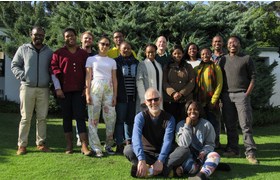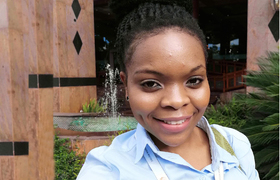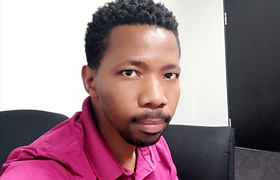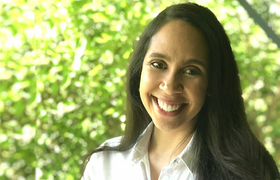Maxwell Tawanda Chirehwa: New nGAP associate
29 April 2020 | Story Maxwell Chirehwa. Photo Supplied. Read time 3 min.
Maxwell Chirehwa is a research officer in the Division of Clinical Pharmacology in the Department of Medicine at the University of Cape Town (UCT). He has been with the university since July 2013, first as a PhD student and then as a postdoctoral research fellow before his current appointment.
Chirehwa is originally from the small rural district of Nyanga in the eastern part of Zimbabwe. He stayed there for the better part of his life before starting his tertiary education. Growing up, he loved mathematics, but also had a soft spot for pharmacy, just because his uncle and aunt were pharmacists.
In 1996 he was selected as part of the first cohort of students to study computer science in the first year of high school. His love for mathematics faded, but six years later he found himself studying towards an honours degree in applied mathematics – not by choice, but because he had not attained enough entry points to study for a degree in computer science.
Chirehwa went on to complete a master’s degree in biostatistics with applications in public health at the University of Zimbabwe in 2008. His research focused on describing the relationship between socio-demographic characteristics and the rate of new sexual partner formation among adolescent girls in areas with a high risk of HIV infection.
After two years of conducting public health research, he was awarded the Vlaamse Interuniversitaire Raad – Universitaire Ontwikkelingssamenwerking scholarship to study towards a master’s degree in statistics, specialising in biostatistics at Hasselt University, Belgium. It was an honour for him to sit in classes taught by distinguished biostatistics professors. In the second year of his master’s degree (2012), he applied a newly developed statistical method to describe the spatial distribution of three fish species in the North Sea.
Research
Chirehwa’s research is in the field of pharmacometrics, which uses mathematical and statistical models to describe the time course of drug concentrations in the body and to explore relationships between these concentrations and drug effects (both beneficial and harmful). The focus of his research is on antituberculosis drugs. Pharmacometrics is a very scarce skill globally.
He also engages in the co-supervision of PhD students, maintenance of pharmacometric modelling software on UCT’s high-performance computing environment and assisting clinical researchers with statistical aspects of their research.
Five years ago, together with colleagues at Stellenbosch University, he developed and implemented a curriculum for a master’s degree in biostatistics. Recently, he has been participating in an initiative to build pharmacometric modelling capabilities in Africa. His motivation derives from the analysis of complex data to draw clear and simple conclusions to improve treatment outcomes.
“Maxwell is an incredible asset to our research group. His pharmacometric and statistical skills are both crucial for the clinical drug studies that we do. He has made important contributions to optimising doses of drugs used to treat tuberculosis,” said Gary Maartens, head of the Division of Clinical Pharmacology.
Chirehwa has already attended nGAP meetings and contributed his experience of UCT and his medical expertise in terms of making sense of COVID-19.
“I hope to learn from other associates and contribute significantly to the success of the prestigious nGAP programme.”
 This work is licensed under a Creative Commons Attribution-NoDerivatives 4.0 International License.
This work is licensed under a Creative Commons Attribution-NoDerivatives 4.0 International License.
Please view the republishing articles page for more information.
Related










